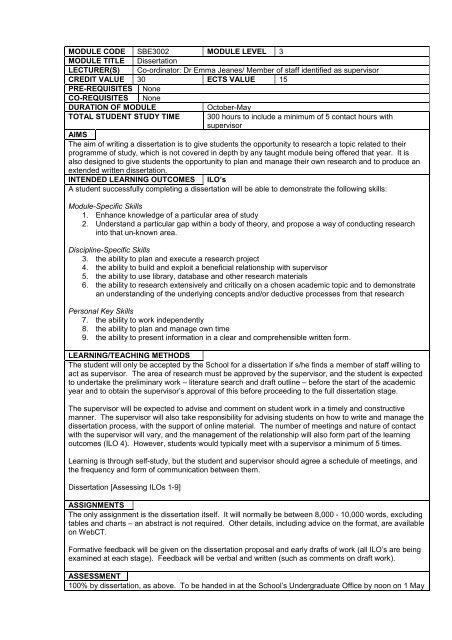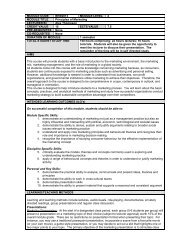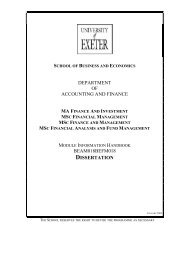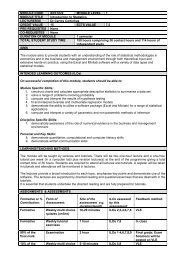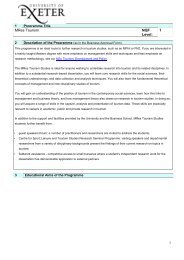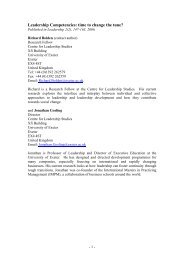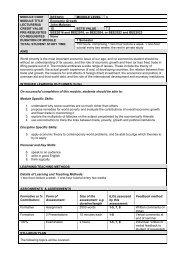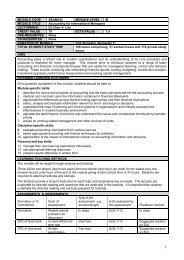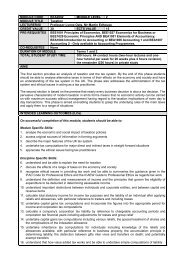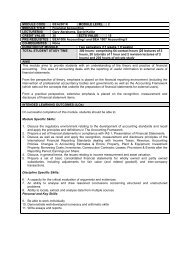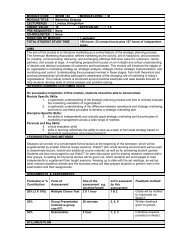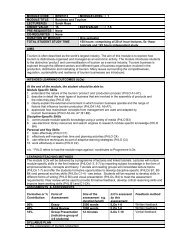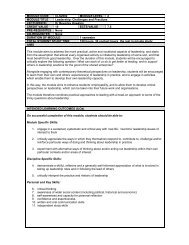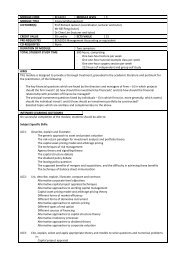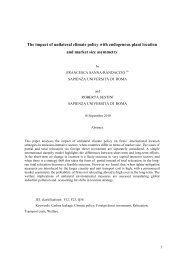MODULE CODE SBE3002 MODULE LEVEL 3 MODULE TITLE ...
MODULE CODE SBE3002 MODULE LEVEL 3 MODULE TITLE ...
MODULE CODE SBE3002 MODULE LEVEL 3 MODULE TITLE ...
You also want an ePaper? Increase the reach of your titles
YUMPU automatically turns print PDFs into web optimized ePapers that Google loves.
<strong>MODULE</strong> <strong>CODE</strong> <strong>SBE3002</strong> <strong>MODULE</strong> <strong>LEVEL</strong> 3<br />
<strong>MODULE</strong> <strong>TITLE</strong> Dissertation<br />
LECTURER(S) Co-ordinator: Dr Emma Jeanes/ Member of staff identified as supervisor<br />
CREDIT VALUE 30 ECTS VALUE 15<br />
PRE-REQUISITES None<br />
CO-REQUISITES None<br />
DURATION OF <strong>MODULE</strong> October-May<br />
TOTAL STUDENT STUDY TIME 300 hours to include a minimum of 5 contact hours with<br />
supervisor<br />
AIMS<br />
The aim of writing a dissertation is to give students the opportunity to research a topic related to their<br />
programme of study, which is not covered in depth by any taught module being offered that year. It is<br />
also designed to give students the opportunity to plan and manage their own research and to produce an<br />
extended written dissertation.<br />
INTENDED LEARNING OUTCOMES ILO’s<br />
A student successfully completing a dissertation will be able to demonstrate the following skills:<br />
Module-Specific Skills<br />
1. Enhance knowledge of a particular area of study<br />
2. Understand a particular gap within a body of theory, and propose a way of conducting research<br />
into that un-known area.<br />
Discipline-Specific Skills<br />
3. the ability to plan and execute a research project<br />
4. the ability to build and exploit a beneficial relationship with supervisor<br />
5. the ability to use library, database and other research materials<br />
6. the ability to research extensively and critically on a chosen academic topic and to demonstrate<br />
an understanding of the underlying concepts and/or deductive processes from that research<br />
Personal Key Skills<br />
7. the ability to work independently<br />
8. the ability to plan and manage own time<br />
9. the ability to present information in a clear and comprehensible written form.<br />
LEARNING/TEACHING METHODS<br />
The student will only be accepted by the School for a dissertation if s/he finds a member of staff willing to<br />
act as supervisor. The area of research must be approved by the supervisor, and the student is expected<br />
to undertake the preliminary work – literature search and draft outline – before the start of the academic<br />
year and to obtain the supervisor’s approval of this before proceeding to the full dissertation stage.<br />
The supervisor will be expected to advise and comment on student work in a timely and constructive<br />
manner. The supervisor will also take responsibility for advising students on how to write and manage the<br />
dissertation process, with the support of online material. The number of meetings and nature of contact<br />
with the supervisor will vary, and the management of the relationship will also form part of the learning<br />
outcomes (ILO 4). However, students would typically meet with a supervisor a minimum of 5 times.<br />
Learning is through self-study, but the student and supervisor should agree a schedule of meetings, and<br />
the frequency and form of communication between them.<br />
Dissertation [Assessing ILOs 1-9]<br />
ASSIGNMENTS<br />
The only assignment is the dissertation itself. It will normally be between 8,000 - 10,000 words, excluding<br />
tables and charts – an abstract is not required. Other details, including advice on the format, are available<br />
on WebCT.<br />
Formative feedback will be given on the dissertation proposal and early drafts of work (all ILO’s are being<br />
examined at each stage). Feedback will be verbal and written (such as comments on draft work).<br />
ASSESSMENT<br />
100% by dissertation, as above. To be handed in at the School’s Undergraduate Office by noon on 1 May
(if 1 May is a Saturday or a Sunday, then the following Monday; if 1 May is a Bank Holiday, then by noon<br />
the following day).<br />
SYLLABUS PLAN<br />
As agreed with the supervisor.<br />
INDICATIVE BASIC READING LIST<br />
This will depend on the topic chosen.<br />
Supporting information can be found on the SoBE webct homepage.<br />
General ‘how to write a dissertation’ texts may also be of help:<br />
Dunleavy, P. (2004) Authoring a PhD: How to plan, draft, write and finish a doctoral thesis or dissertation.<br />
Palgrave Macmillan.<br />
Swetnam, D. (2000) Writing Your Dissertation How to Book Ltd (3 rd ed)<br />
DATE OF LAST REVISION: October 2007


